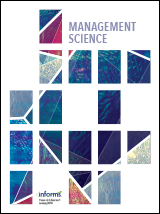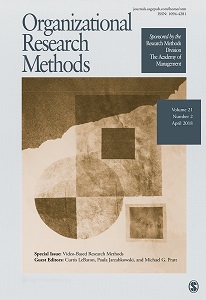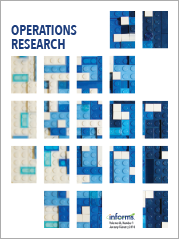Academic articles
Practitioner articles
Working papers
Books
Book chapters
Case studies
Other publications
Subject(s)
Management sciences, decision sciences and quantitative methods; Technology, R&D management
Keyword(s)
decertification, innovation, quality management, standards
JEL Code(s)
L15, O32, L25.
The literature on quality-management standards has generally focused on the drivers, motivations, and performance effects of adopting such standards. Yet the last decade has witnessed a substantial degree of decertification behavior, as organizations have increasingly decided to voluntarily withdraw from quality-management standards by not recertifying. While the drivers of the decision to initially adopt quality-management standards have been extensively studied, the drivers of the decision to decertify have received scant scholarly attention. We argue that innovative organizations are generally prone to retaining quality-management certification and thus exhibit a tendency to not abandon certification; however, radically-innovative organizations are more prone than incrementally-innovative organizations to discontinue quality-management standards and thereby exhibit a tendency to withdraw from quality certification. We compile World Bank data surveying facilities based in 50 countries and 103 industrial sectors across the 2003 to 2017 period. Taking advantage of the data’s panel properties yields a dataset composed of up to 1,755 facility-level observations of recertification decisions for empirical analysis. Our empirical testing employs a probit estimation technique that accounts for the appropriate fixed effects and generates results that support our theoretical priors regarding decertification behavior.
With permission of Elsevier
Volume
52
Journal Pages
104647
Subject(s)
Management sciences, decision sciences and quantitative methods; Product and operations management; Technology, R&D management
Keyword(s)
Data, machine learning, data product, pricing, incentives, contracting
This paper explores how firms that lack expertise in machine learning (ML) can leverage the so-called AI Flywheel effect. This effect designates a virtuous cycle by which, as an ML product is adopted and new user data are fed back to the algorithm, the product improves, enabling further adoptions. However, managing this feedback loop is difficult, especially when the algorithm is contracted out. Indeed, the additional data that the AI Flywheel effect generates may change the provider's incentives to improve the algorithm over time. We formalize this problem in a simple two-period moral hazard framework that captures the main dynamics among ML, data acquisition, pricing, and contracting. We find that the firm's decisions crucially depend on how the amount of data on which the machine is trained interacts with the provider's effort. If this effort has a more (less) significant impact on accuracy for larger volumes of data, the firm underprices (overprices) the product. Interestingly, these distortions sometimes improve social welfare, which accounts for the customer surplus and profits of both the firm and provider. Further, the interaction between incentive issues and the positive externalities of the AI Flywheel effect has important implications for the firm's data collection strategy. In particular, the firm can boost its profit by increasing the product's capacity to acquire usage data only up to a certain level. If the product collects too much data per user, the firm's profit may actually decrease, i.e., more data is not necessarily better.
Copyright © 2022, INFORMS
Volume
68
Journal Pages
8791–8808
ISSN (Online)
1526-5501
ISSN (Print)
0025–1909
Subject(s)
Economics, politics and business environment; Strategy and general management; Technology, R&D management
Keyword(s)
Pharmaceuticals, patent, Markush
Markush structures are molecular skeletons containing not only specific atoms but also placeholders to represent broad sets of chemical (sub)structures. As genus claims, they allow a vast number of compounds to be claimed in a patent application without having to specify every single chemical entity. While Markush structures raise important questions regarding the functioning of the patent system, innovation researchers have been surprisingly silent on the topic. This paper summarizes the ongoing policy debate about Markush structures and provides first empirical insights into how Markush structures are used in patent documents in the pharmaceutical industry and how they affect important outcomes in the patent prosecution process. While not causing frictions in the patent prosecution process, patent documents containing Markush structures have an increased likelihood to restrict the patentability of follow-on inventions and to facilitate the construction of broad patent fences.
With permission of Elsevier
Volume
51
Journal Pages
104597
Subject(s)
Economics, politics and business environment
Keyword(s)
trade platform, hybrid business model, steering, regulation
JEL Code(s)
D42, L12, L13, L40, H25
We illustrate conditions under which a trade platform selling its own products alongside third-party sellers benefits or harms consumers. This benefits consumers by lowering prices in a suite of models: a gatekeeper platform facing a competitive fringe of sellers, when fringe sellers also have their own channels perfectly or imperfectly substitutable to the platform; when the gatekeeper platform with fringe sellers competes against a big seller with market power on a differentiated alternative channel; and when the gatekeeper platform hosts only a big seller with market power. Platform product entry might harm consumers when a big firm sells both on the platform and on its alternative channel. The platform selling its own products harms consumers when consumers have heterogenous tastes for variants of products and the platform can control the access of fringe sellers via its commission and own product price. We also review the recent literature to highlight other channels via which benefits and harm arise from the platform selling its own products in its marketplace.
With permission of Elsevier
Volume
84
Journal Pages
102861
Subject(s)
Human resources management/organizational behavior
Keyword(s)
error, error management, failure, psychological safety, organizational learning
Even if we strive for an organizational learning culture that does not punish mistakes and failure, implementation is difficult. Especially when damage has been done, people are quick to talk about "culprits" and "sanctions," but this benefits no one. Analysis of the failure usually reveals that several factors played a role. Talking openly about this requires that the employees feel psychologically safe.
In aviation, openly dealing with mistakes is not only tolerated, but actively demanded. There, it is not the error that is the problem, but the unrecognized – or worse – the unreported error. This leads to the seemingly paradoxical result that, in the area of a high-risk organization of all places, the open, non-punitive handling of errors is the norm. The focus is on learning from mistakes in order to be able to avoid them henceforth. This principle should also apply to companies that want to reduce the errors that occur in their projects and processes.
In aviation, openly dealing with mistakes is not only tolerated, but actively demanded. There, it is not the error that is the problem, but the unrecognized – or worse – the unreported error. This leads to the seemingly paradoxical result that, in the area of a high-risk organization of all places, the open, non-punitive handling of errors is the norm. The focus is on learning from mistakes in order to be able to avoid them henceforth. This principle should also apply to companies that want to reduce the errors that occur in their projects and processes.
Journal Pages
218–222
Subject(s)
Economics, politics and business environment
Keyword(s)
big Five personality traits, Locus of Control, Risk attitudes, age-period-cohort decomposition, life cycle
JEL Code(s)
D8, J1
Volume
123
Journal Pages
2141–2172
Subject(s)
Management sciences, decision sciences and quantitative methods
Keyword(s)
research reliability, generalizability, archival data, reproducibility, context sensitivity
Volume
119
Journal Pages
2120377119
Subject(s)
Management sciences, decision sciences and quantitative methods
Keyword(s)
Brokering process, behavioral measure, relational events sequences, network algebra
Extant research in organizational networks has provided critical insights into understanding the benefits of occupying a brokerage position. More recently, researchers have moved beyond the brokerage position to consider the brokering processes (arbitration and collaboration) brokers engage in and their implications for performance. However, brokering processes are typically measured using scales that reflect individuals’ orientation toward engaging in a behavior, rather than the behavior itself. In this article, we propose a measure that captures the behavioral process of brokering. The measure indicates the extent to which actors engage in arbitration versus collaboration based on sequences of time stamped relational events, such as emails, message boards, and recordings of meetings. We demonstrate the validity of our measure as well as its predictive ability. By leveraging the temporal information inherent in sequences of relational events, our behavioral measure of brokering creates opportunities for researchers to explore the dynamics of brokerage and their impact on individuals, and also paves the way for a systematic examination of the temporal dynamics of networks.
With permission of SAGE Publishing
Volume
25
Journal Pages
459–489
Subject(s)
Human resources management/organizational behavior
Keyword(s)
Boundary spanning, supervisor undermining, territoriality, advice seeking
JEL Code(s)
M12
Volume
107
Journal Pages
1009–1019
Subject(s)
Management sciences, decision sciences and quantitative methods
Keyword(s)
Sequential decision making, time pressure, information search, Bayesian inference
Arrow et al. (1949) introduced the first sequential search problem, “where at each stage the options available are to stop and take a definite action or to continue sampling for more information." We study how time pressure in the form of task accumulation may affect this decision problem. To that end, we consider a search problem where the decision maker (DM) faces a stream of random decision tasks to be treated one at a time, and accumulate when not attended to. We formulate the problem of managing this form of pressure as a Partially Observable Markov Decision Process, and characterize the corresponding optimal policy. We find that the DM needs to alleviate this pressure very differently depending on how the search on the current task has unfolded thus far. As the search progresses, the DM is less and less willing to sustain high levels of workloads in the beginning and end of the search, but actually increases the maximum workload she is willing to handle in the middle of the process. The DM manages this workload by first making a priori decisions to release some accumulated tasks, and later by aborting the current search and deciding based on her updated belief. This novel search strategy critically depends on the DM's prior belief about the tasks, and stems, in part, from an effect related to the decision ambivalence. These findings are robust to various extensions of our basic set-up.
© 2019, INFORMS
Volume
70
Journal Pages
1293–1952



